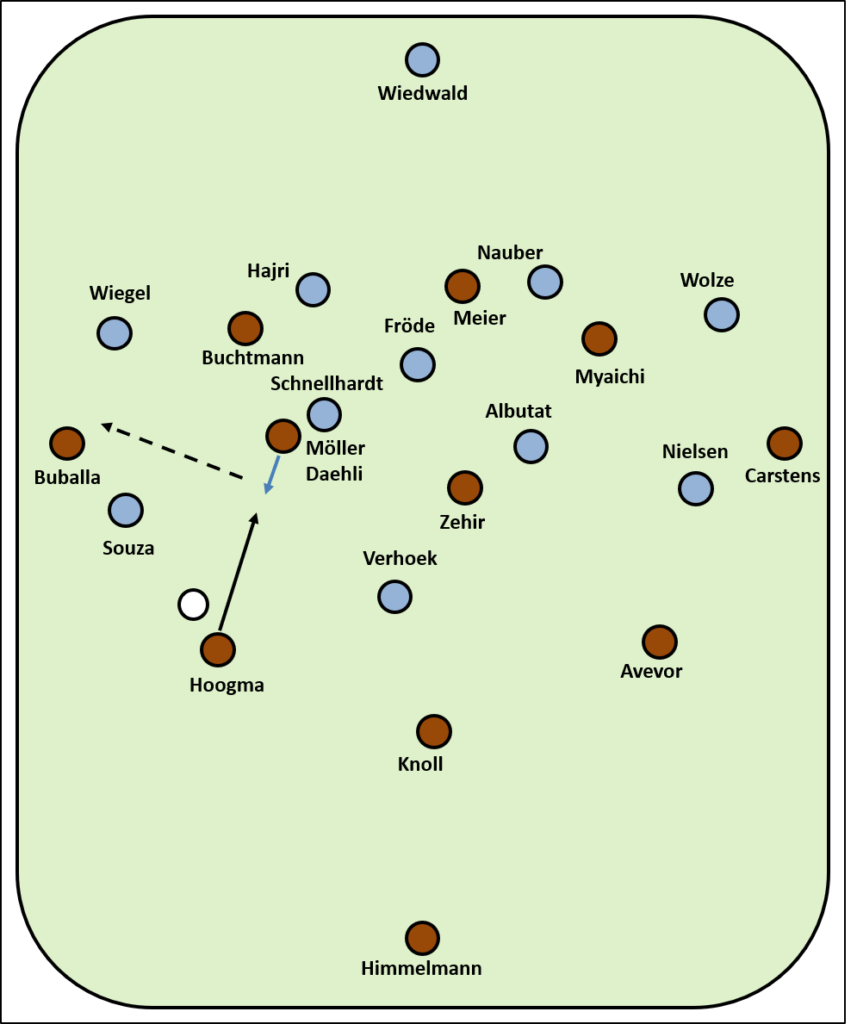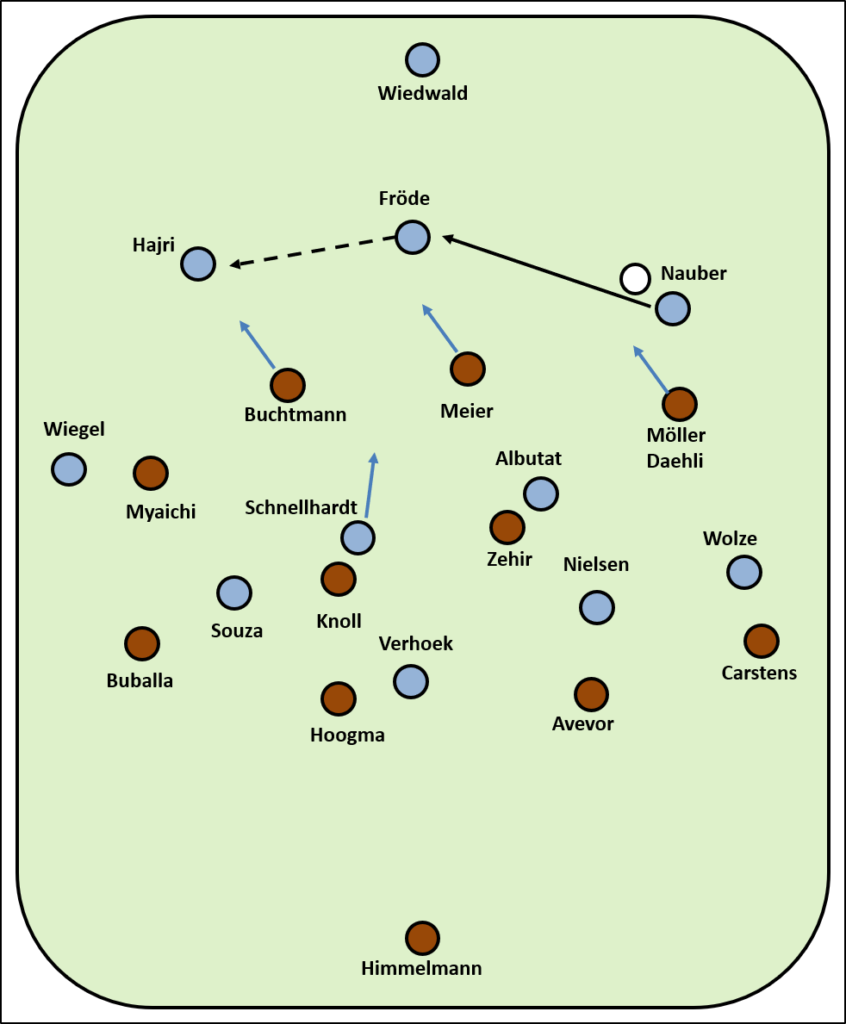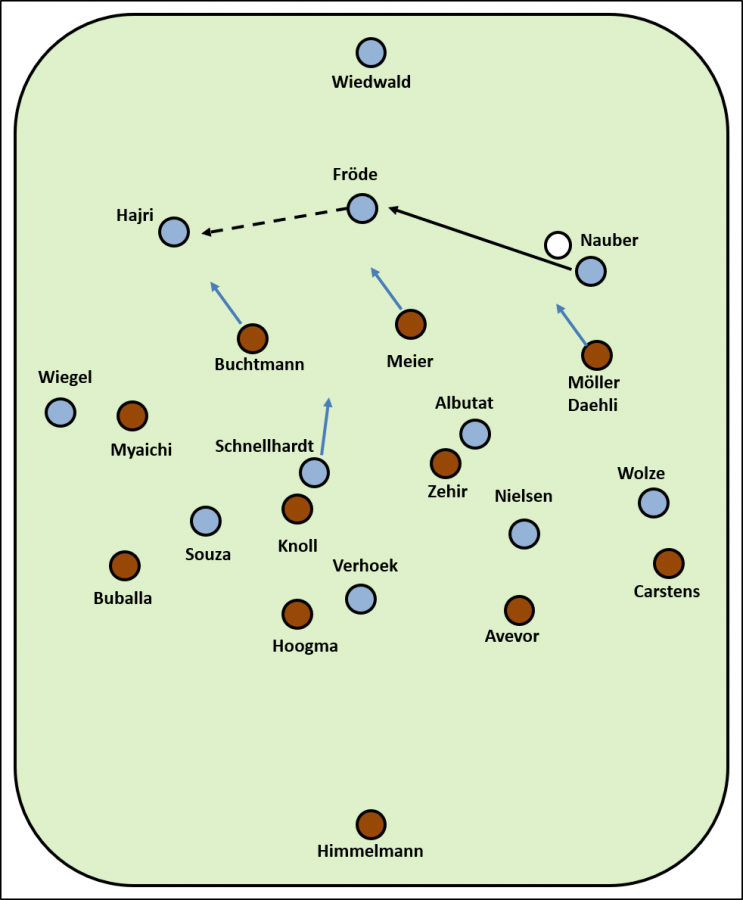Natürlich hätten wir gewinnen müssen. Zum einen, um den Anschluss an die Teams auf den Aufstiegsrängen zu halten (deshalb war es gestern ein Rückschlag), zum anderen, weil wir dieses Spiel dominiert und fast vergessenen Ballbesitzfußball des FCSP gesehen haben (deshalb war es gestern ein Schritt nach vorne). Und mit dieser Erkenntnis, dem Fortschritt, der irgendwie aufgrund der fehlenden Tore auch ein Rückschlag war, starten wir in eine Analyse des Spiels.
Der MSV Duisburg ist in gar keiner so schlechten Form. Und mit dieser Aussage möchte ich gleich mal Wind aus den Segeln derer nehmen, die rumpupen, dass man ja als Tabellen-4. gegen den Tabellen-17. gefälligst haushoch zu gewinnen habe. Ich mag mich wiederholen, aber: Die zweite Liga ist einfach viel zu dicht beieinander um von den Tabellenständen auf ein klares Spiel schließen zu können oder das gar zu verlangen (vor allem nach unserer Vorgeschichte mit 0-8 Toren aus den letzten beiden Spielen). Mit dem Spiel gegen den FCSP hat der MSV in den letzten vier Spielen nur ein einziges Gegentor kassiert. Zwar haben die dabei jeweils kein Offensivfeuerwerk abgebrannt (nur zwei eigene Tore), aber doch immerhin sechs Punkte mitgenommen und sind nun seit vier Spielen ungeschlagen. Beim Spiel am Millerntor hatte der MSV Duisburg dann auch nur in einer Phase von etwa 15 Minuten in der ersten Halbzeit mit Nachdruck ihr Interesse an einem eigenen Torerfolg gezeigt. In allen anderen Phasen hat der FCSP dieses Spiel dominiert.
52% Ballbesitz. Das erscheint auf den ersten Blick nicht ein besonders hoher Anteil zu sein. Allerdings muss dabei berücksichtigt werden, dass der FCSP vor diesem Spieltag mit durchschnittlich 43,7% Ballbesitz den niedrigsten Anteil aller Zweitligisten aufwies. Ja, Ballbesitz alleine ist ein Parameter mit wirklich schwacher Aussagekraft (ich bringe im Verlauf des Textes noch ein paar weitere, die das Bild etwas runder machen). Doch zeichnete es den FCSP bei diesem Spiel aus, dass tatsächlich nahezu gänzlich auf lange Bälle in die Spitze und dem Spiel auf zweite Bälle verzichtet wurde.
Der MSV verteidigte konsequent in einem 4-1-4-1, mit Fröde als Sechser und Verhoek als leichten Störfaktor für das Aufbauspiel des FCSP. Beim Aufbau des FCSP rückten die Außenverteidiger Carstens und Buballa weit mit auf, insbesondere in der 2.Hlabzeit sogar bis in die letzte Linie von Duisburg. Die äußeren Mittelfelder, Miyaichi und Møller-Dæhli hingegen bewegten sich meist mehr in den Halbräumen und schufen so Platz für die Außenverteidiger. In der ersten Halbzeit war es meist Marvin Knoll der sich zwischen die beiden Innenverteidiger fallen ließ. Diese Dreierreihe konnte meist recht ruhig, da nur von Verhoek leicht gestört, aufbauen. Ziel war es hierbei den Ball auf einen der Außenverteidiger zu spielen, welches jedoch meist durch die breite Staffelung des MSV mit der Viererkette im Mittelfeld nicht direkt möglich war. Daher war es die Aufgabe der eigenen Mittelfeldspieler sich immer wieder etwas tiefer anzubieten. Durch dieses tiefe Anbieten wurde vertikaler Druck auf die Viererkette des MSV aufgebaut, welche dann die Abstände nicht mehr ganz halten konnte. Wurde das erreicht, so konnte der Ball dann über den Umweg im Zentrum auf die Außenbahn geleitet werden. Das funktionierte eigentlich ziemlich gut, da sich die Mittelfeldspieler recht variabel zeigten: Sowohl Buchtmann als auch Møller-Dæhli , aber auch – wenn Zehir sich zwischen die Innenverteidiger fallen ließ – Knoll boten sich für diese, den Angriff eröffnende Aktion immer wieder tief an. Besonders in der zweiten Halbzeit konnten so etliche Angriffe eingeleitet werden. In der ersten Halbzeit gab es mit der Taktik noch einige Anpassungsschwierigkeiten, da Bälle zu früh ins Mittelfeld gespielt wurden.

Auch der MSV versuchte einen Spielaufbau mit einer Dreierkette. Hierbei fiel Sechser Fröde zwischen die Innenverteidiger. Meist steht der FCSP mit einem 4-4-2 in der Grundformation gegen den Ball. Gegen Duisburg kam es aber häufig vor, dass sich Miyaichi oder Møller-Dæhli mit in vorderste Reihe begaben und so bereits enormen Druck auf die erste Aufbaureihe der Duisburger ausübten. Auch das funktionierte sehr gut. Am besten vor allem dann, wenn Knoll und Zehir mannorientiert gegen Schnellhardt und Albutat spielten und verhinderten, dass diese sich tief als Anspielstationen anbieten konnten. War dies nicht der Fall, so konnte der MSV durchaus auch mal schnell durch das Zentrum spielen. Meist war es Schnellhardt (der Name ist Programm), der sich durch einen kurzen Sprint von Knoll löste und dann aufdrehen und so Souza oder Nielsen ins Spiel bringen konnte. Hingegen blieb Albutat eigentlich das gesamte Spiel über eher blass.
Es erschient vollkommen logisch, dass gegen eine Dreierkette mit einer Dreierkette gepresst wird. Warum also wurde das in anderen Spielen vom FCSP nicht getan? Nun, ein Anlaufen der Verteidiger mit eben der gleichen Anzahl an Angreifern bedeutet auch, dass sich die nummerische Gleiche in den hinteren Teilen des Spielfeldes fortsetzt. Bei so einem Pressing wird das gegnerische System quasi gespiegelt. Es ergeben sich also in allen Teilen des Spielfeldes 1-gegen-1 Situationen, also durchaus ein Risiko. Wenn allerdings so tief aufgebaut wird, wie es der MSV gemacht hat, dann bleibt selbst beim Überspielen der ersten Pressingreihe immer noch genug Zeit mit möglichst vielen Spielern hinter den Ball zu gelangen, bevor es dann wirklich brenzlig werden würde. Dies ist ein klarer Wechsel im grundlegenden System des FCSP. Im bisherigen Saisonverlauf wählte der FCSP hier eher immer die Variante ‚Safety first‘. Dabei rückten die äußeren Mittelfelder immer mit den Außenverteidigern mit, agierten also mannorientiert. Wenn diese dann sich weit nach vorne orientierten (siehe Santos beim Derby), dann bewegten sich auch die äußeren Mittelfelder des FCSP mit in die eigene letzte Reihe. Gegen den MSV waren diese Bewegungen teilweise auch zu sehen, jedoch meist nur im Moment des defensiven Umschaltens. Sobald sich alle Spieler in der Formation eingefunden hatten, rückten die äußeren Mittelfelder wieder vor und agierten somit raumorientiert.

Diese Art des Pressings funktionierte sehr gut gegen den MSV Duisburg, sodass vor allem in der zweiten Halbzeit eigentlich kaum noch ein geordneter Spielaufbau der Gäste zu erkennen war. In der ersten Halbzeit war es allen voran das tiefe Anbieten von Schnellhardt, welches ab und an für ein Misslingen des partiell hohen Pressings sorgte.
Und so entwickelte sich am Freitag ein Spiel, bei dem der FCSP gänzlich flach aufbauen konnte. Dieser Aufbau wusste zu gefallen. Mir zumindest. Ich vernahm jedoch immer und immer wieder hörbaren Unmut darüber, wenn der Ball dann doch noch einmal hinten rum gespielt wurde, damit eine Verlagerung möglich ist. Leute, wenn Duisburg keine Räume anbietet, dann gibt es keine andere Möglichkeit als den Ball über die eigenen Verteidiger zirkulieren zu lassen. Mir haben die variablen Bewegungen im Mittelfeld gefallen. Und im Vergleich zu anderen Spielen war ein klarer Fokus auf eben diesen Ballbesitzfußball zu erkennen (gespielte Pässe vs. Duisburg: 514; vs. Sandhausen: 469, vs. Paderborn: 305, vs. Ingolstadt: 326). Hättet ihr es lieber, wenn da wieder lange Bälle nach vorne geknolzt werden, sobald sich beim ersten Versuch keine flache Anspielstation bietet?! Ich jedenfalls nicht. Mir ist es lieber, wir bleiben im Ballbesitz, auch wenn das bedeutet, dass wir eine ganze Aktion abbrechen und neu aufbauen müssen. Gut, der MSV hat es auch nicht darauf angelegt, den FCSP in diesem Stadium des Spielaufbaus zu stören. Trotzdem, der FCSP schaffte es immer und immer wieder die Bälle kontrolliert in das letzte Drittel zu befördern. Ein Beleg dafür sind die gespielten Pässe im Angriffsdrittel (FCSP: 176, MSV: 88). Erzwungenes Spiel über zweite Bälle? Fehlanzeige. Das führt dann auch zu weit weniger Ballverlusten (gegen Ingolstadt waren es 46, gegen den MSV halb so viele). Nur, es fehlten halt die nötigen Tore. Chancen dafür waren durchaus vorhanden (expected Goals 1,3 zu 0,4).
Somit gewinnt der FCSP mal wieder ein Spiel nicht, bei dem er sich die drei Punkte durchaus verdient hätte. Das hatten wir auch lange nicht mehr. Insgesamt war es aber ein guter Auftritt. Warum es trotzdem Pfiffe für das eigene Team nach Spielende gab, verstehe ich nicht (ohnehin verstehe ich Pfiffe gegen das eigene Team nicht). Nein, es war ein Auftritt mit einer klaren Spielanlage und mit einem gut aufgelegten Zehir, der vor allem in der zweiten Halbzeit einige gute Angriffe initiierte. Mit Alex Meier, der bei langen Bällen von Duisburg defensiv gegen Verhoek agierte und diese Kopfballduelle meist gewann. Leider mit Miyaichi, dem irgendwie das Ballgefühl abhanden gekommen zu sein scheint. Und nein, nicht mit Flum, dem in diesem System von Zehir der Rang abgelaufen wurde. Und leider auch nicht mit Allagui, dem eher ein System mit zwei Stürmern entgegenkommt.
Auf den Rängen wurde dann mächtig an Beziehungen gearbeitet. Es wurden von Nord und Gegengerade viele Herzen in Richtung Südtribüne versendet, welche sich ihrerseits zu Spielbeginn ganz errötet zeigte. Und zusätzlich wurde sich noch kollektiv gegen Kollektivstrafen gestellt. Viel wurde über diese Thematik geschrieben. Sicher wird auch noch viel darüber geschrieben. Ich tue es an dieser Stelle nur kurz: All You Need Is Love!
//Tim
Links:
– Zaphod Beebleblox: Alles schon gesehen, nur mit Toren isses schöner
– Magischer FC: Titel sind überbewertet
– Bilder: Stefan Groenveld: „Sankt Pauli hat die Bombe„
(Translation by @parneq)
Of course, we would have needed to win. On the one hand, to keep the close distance to the promotion positions (this is why yesterday can be seen as a setback), on the other hand because we dominated the whole match and were able to witness almost forgotten ball possession football of the FCSP (this is why yesterday’s match was a step to the front). And with the insight that the progress was somehow also a setback at the same time due to a lack of goals, let’s start to analyse the match.
The MSV Duisburg isn’t in such a bad state at the moment. And with this statement I’d also like to steal thunder of those prattling that the fourth of the table has to defeat the 17th by all means. I may repeat myself but the second league is just too close to each other to be able to draw a clear conclusion from the league’s table or even more, to demand such results (especially after losing the last two matches by 0-8 in total). Including the match against the FCSP, the MSV did only catch one goal within the last four matches. However, they did not play a vastly superior attacking football either (they scored only two goals) but collected six points and did not get beaten within their last four matches. In the match at the Millerntor stadium, the MSV Duisburg did also only show a huge interest to score a goal during some 15 minutes of the first half. For the rest of the game, the FCSP dominated the match.
52% of ball possession. At first sight, this does not appear as a particular high value. However, before this match the FCSP had the lowest value of all competitors of the second division in this regard with 43.7% on average only. Of course, ball possession on its own is only a parameter with very little significance (Thus, I will show some more parameters during the cause of this article to illustrate the overall picture). However, contrary to previous matches, the FCSP wasn’t too prone for long shots to the front and to wait for second shots in this match.
The MSV permanently defended in a 4-1-4-1 formation with Fröde as a central defensive midfielder and with Verhoek as a slight disturbing factor to FCSP’s build-up play. During FCSP’s build-up, both fullbacks Carstens and Buballa moved way to the front, particularly during the second half when they moved almost up to MSV’s back four. Whereas the wingers Miyaichi and Møller-Dæhli mostly acted towards the centre and thus created more space for the fullbacks. During the first half, it was often Marvin Knoll who dropped between the central defenders. Due to only very little attacking from Verhoek, this line of three could build up almost undisturbed. Their aim was to pass the ball to the forward moving fullbacks, however, this was often impossible due to the wide positioning of the MSV’s midfielders line. Thus, the own midfielders had to position themselves a little bit further behind, which resulted in vertical pressure against the MSV’s midfielders line of four, which were then not entirely able to keep their distances. If the plan worked out, after a short detour through the centre, the ball could be passed to the flanks. This worked quite well due to a rather flexible play of the midfielders: Buchtmann and Møller-Dæhli, as well as Knoll (if Zehir dropped between the central defenders) were offering themselves to initiate attacks from deep positionings. Especially during the second half, various attacks could be initiated doing just that whereas during the first half this tactic was not yet well set into play because of too many early passes to the centre.

Alike FCSP, the MSV tried to initiate their build-up play with a line of three in the back. Thereby, the central defensive midfielder Fröde dropped between the central defenders. Usually, the FCSP defends with a 4-4-2 formation. Against Duisburg however, Miyaichi and Møller-Dæhli often also moved towards the first line, where both were able to create a high pressure against the build-up line of Duisburg. This worked out pretty well. Especially, when Knoll and Zehir played man-to-man against Schnellhardt and Albutat respectively and thus made it impossible for them to make themselves available for a pass while positioned deeply. If they didn’t, the MSV was quite able to quickly pass the ball through the centre. It was mostly Schnellhardt (the name says it all; ‘schnell’ = ‘quick’), who was able to get rid of Knoll by a quick sprint and thus, while quickly attacking, integrate Souza or Nielsen into the play. Whereas Albutat remained rather pale throughout the entire game.
It’s completely logical that a line of three is best pressed at by a line of three. Why didn’t the FCSP already do this during earlier matches? Well, to match the number of defendants with the same number of players pressing against them also means that this numerically equal situation has also to be positioned in all other parts of the pitch. The opponent’s system is technically mirrored and thus man-to-man situations become likely at every other position on the pitch. This might be risky. However, if a team is building up as deeply positioned as the MSV did, there is still enough time to get behind the ball with as many fielders as possible to avoid precarious situations, even if the first pressing line of three is outplayed. This is a clear change to the basic formation of the FCSP. Until Friday, the FCSP rather chose a safety-first option when the wingers were following the fullbacks in order to act rather focused on man-to-man situations. If the fullbacks moved towards the front (see also Santos during the derby), the same was true for FCSP’s wingers who then dropped into the last line of defence. These movements could also be witnessed against the MSV, however, mostly during situations when the system switched into its defence formation. As soon as every fielder found its position in the formation, the wingers moved back to the front and were thus acting space oriented.

This type of pressing worked out pretty well against MSV Duisburg. Especially during the second half, an ordered build-up play of the visitors could nearly not be witnessed. During the first half, the deep positioning of Schnellhardt however still resulted sometimes in the failing of the high pressing of FCSP.
And this is why there was a match developing on Friday in which the FCSP was able to initiate a flat build-up play. This build-up play was appealing. To me at least. However, I more and more witnessed people complaining about the fact that the ball was passed to the defence over and over again in order to initiate a shift of the positionings. Guys, if Duisburg isn’t offering any spaces, there’s no other option than to let the ball circulate between the own defenders. I really liked the variable movements in the centre. And compared to other matches, there was a clear focus to this ball possession type of play recognizable (played passes vs. Duisburg 514, vs. Sandhausen: 469, vs. Paderborn: 305, vs. Ingolstadt: 326). Do you really prefer all these long shots to the front again as soon as there’s no one to pass to straight away? Well, for sure I don’t. I prefer to stay in ball possession even if this means to stop a whole action and to build-up entirely new. Okay, the MSV did not intend to interrupt the FCSP during their state of build-up play. However, the FCSP was more and more capable to move the ball controlled to the last third. A further proof is the number of passes played in the last third (FCSP: 176, MSV: 88). Were they forced to use second shots? Not at all. Furthermore, they didn’t lose the ball that often (against Ingolstadt they lost 46 balls after such situations, against the MSV this number was only half as big). The only thing missing in this match were goals, although there were quite a few chances to score (expected goals value 1.3 to 0.4).
And thus, the FCSP did not win another game in which they clearly deserved to earn the three points. Long time no see. In total, this was however a great presentation. I absolutely do not understand why the own team was booed by their own supporters after the match (I never understand why the own team gets booed at all). No, the FCSP did present itself with a clear sense of what they wanted their play to look like, with a well prepared Zehir, who especially initiated some great attacks during the second half. And Alex Meier, who defended great against Verhoek and won most of the aerial duels if Verhoek was searched for with long shots. Sadly, Miyaichi seems to have lost the feel for the ball. And Flum lost his position to Zehir, who better fits into the new system. And sadly also Allagui missed out, who better fits into a system with two strikers.
On the stands, a lot of work was put into the relationships with the South Stand. A lot of love was send from the Gegengerade and the North Stand towards the South Stand, which flushed due to all this love when the match started. Furthermore, a great coalition emerged throughout all stands against the club’s collective punishment against the South Stand. Already a lot has been written and published in this regard with even more to come. This is why I simply and briefly demand now: All You Need Is Love!
//Tim
Links:
– Zaphod Beebleblox: Alles
schon gesehen, nur mit Toren isses schöner
– Magischer FC: Titel sind überbewertet
– Bilder: Stefan Groenveld: „Sankt Pauli hat die Bombe„





Gegen Hintenrum, wenn vorne dicht ist, ist nichts einzuwenden. Das frustrierende war der Eindruck, das im letzten Drittel immer dann, wenn es wirklich gefährlich hätte werden können, der falsche Pass schlecht gespielt oder der falsche Laufweg gewählt wurde. „Ballbesitzfussball“ ist ja kein Wert an sich, sondern Mittel zum Zweck.
Ich geb dir recht, da saß sicher nicht jeder Laufweg und auch nicht jeder Pass.
Was mich stört ist die Erwartungshaltung, gegen einen tiefstehenden Gegner, der defensiv kaum was zugelassen hat die letzten Spiele, nach zwei deftigen eigenen Niederlagen zuletzt und mit veränderter Taktik.
Und da der Ball nicht verloren wurde, möchte ich mal behaupten, dass es für einen Großteil im Stadion nicht einfach ist, den falschen Laufweg und falschen Pass zu erkennen (ich tue das meist auch erst im Re-Live). Nein, mein Eindruck ist, dass die recht stumpfen Unmutsäußerungen dem Rückpass an sich galten. Und dafür habe ich kein Verständnis.
Mein Eindruck war eher, dass der Unmut dem Empfinden galt, dass der FCSP noch drölf Tage hätte weiterspielen können, ohne ein Tor zu erzielen. Und das Empfinden hatte ich auch.
Eine allgemeine Unzufriedenheit mit lautem Unmut zufällig immer genau in den Momenten, in denen das Spiel hinten herum neu aufgebaut wird? Das mag für dich stimmen, Slarti. Ich möchte aber behaupten, dass ein Großteil derer, die in solchem Momenten pfeifen, etc. sich über den Rückpass als solches aufregten. Und dafür habe ich kein Verständnis.
Ah, ok – Pfiffe habe ich erst ab der 89. Minute mitbekommen und sie dann in den beschriebenen Kontext gestellt.
Ich möchte sicher auch nicht das Motzen auf den Tribünen allgemein verteufeln. Mir platzt auch häufig genug der Kragen. Nur fand ich es genau in den Momenten eher unangebracht
Moin,
super Analyse., wie immer. Danke dafür. Zwei Dinge:
1. Buchmann spielte meiner Wahrnehmung nach im Offensivmodus viel weiter zurückgezogen. Er war Knolls (so Knoll denn zwischen den Verteidigern stand) dessen erster Anspielpartner in der Mitte. Deswegen war Zehirs Rolle dabei etwas unklar. Sie standen sich da etwas auf den Füßen. In der zweiten Halbzeit übernahm er dann noch mehr Verantwortung im Spielaufbau.
2. Die Pfiffe ertönten, weil das Team in den letzten Minuten nicht die geforderte Leidenschaft an den Tag legte, das Spiel noch mit allen Mitteln für sich entscheiden zu wollen. Tat sie auch nicht. Trotzdem sind Pfiffe blöd.
Moin Paul,
danke für deine Rückmeldung!
jo, gerade die Rollen von Knoll und Buchtmann waren auffällig anders als vorher. Knoll positionierte sich relativ hoch, wenn er nicht zwischen die IV fiel. Und Buchtmann ließ sich häufig eben tief fallen, um sich da Bälle abzuholen.
Freut mich hier wieder ne unaufgeregte Auseinandersetzung mit dem Dargebotenem zu lesen, vielen Dank!
Hab es ähnlich gesehen und war überrascht, das es grade am Anfang ganz gut lief.
Hatte Schlimmeres erwartet, sehe deshalb die gehaltene Null und den Punkt als einen Fortschritt.
Obwohl ich mir im Verlaufe des Spiels mehr erhofft hatte…
Pfiffe und Unmutsbekundungen kann ich zwar nachempfinden, aber nicht verstehen.
Jo, hatte mir auch mehr erhofft. Ganz grundsätzlich hätte das Tor ja auch nur noch fallen müssen (siehe Chnace Meier, xG-Werte)